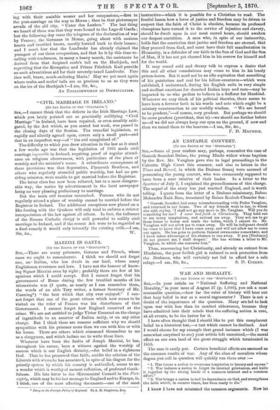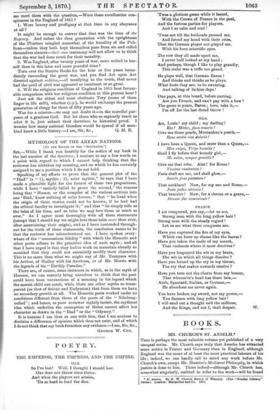WAR AND MORALITY.
[To THE EDITOR OF THE "SPECTATOR."]
Sin,—In your article on " National Suffering and National Morality," in your issue of August 27 (p. 1,030), you ask a most seasonable question,—how far the voice of history will bear out that hazy belief in war as a moral regenerator ? There is not a doubt of the importance of the question. Many are led to look upon war with less than its merited abhorrence, because they have admitted into their minds that the suffering nation is sure, at all events, to be the better for it.
I have often thought that I should like to put this complacent belief to a historical test,—a test which cannot be declined. And I would choose for my example that grand instance which (I was somewhat surprised to see) your article left unnoticed,—the moral effect on our own laud of the great struggle which terminated in 1815.
The case is easily put. Certain beneficial effects are assumed as the common results of war. Any of the class of moralists whose dogma you call in question will quickly run them over :-
" 1. War forces a nation to overcome temptation to luxury and excess."
"2. War induces a nation to forget its internal grievances, and knits it together by the strong bonds of a common interest and a common effort."
" 3. War brings a nation to feel its dependence on God, and strengthens the faith which, in securer times, has been ready to die."
I know I have not misstated the common arguments. Now let me meet them with the question,--Were these excellencies con- spicuous in the England of 1815 ?
1. Were luxury and profligacy at that time in any abeyance at all ?
It might be enough to answer that that was the time of the Regency. And unless the then generation with the uprightness of the Pharisee mingled somewhat of the humility of the Pub- lican—unless they both kept themselves pure from sin and called themselves sinners—their own testimony will not allow us to think that the war had done much for their morality.
2. Was England, after twenty years of war, more united in her- self than in this later and more peaceful time ?
Turn over the Statute Books for the four or five years imme- diately succeeding the great war, and you find Act upon Act directed against sedition,—all testifying to the truth, that never had the peril of civil war appeared so imminent or so great. 3. Will the religious condition of England in 1815 bear favour- able comparison with her religious condition at this present hour ?
Just ask the oldest and most obstinate Tory (some of them linger in life still), whether (e.g.), he would exchange the present generation of clergy for those of fifty years ago.
War has a mission—we may not doubt it—in the merciful pur- poses of a gracious God. But let those who so sapiently teach us what it is, just submit their doctrines to historical proof. I wonder how many national blunders would be spared if all man- kind knew a little history.—I am, Sir, &c., Q. M. It.































 Previous page
Previous page